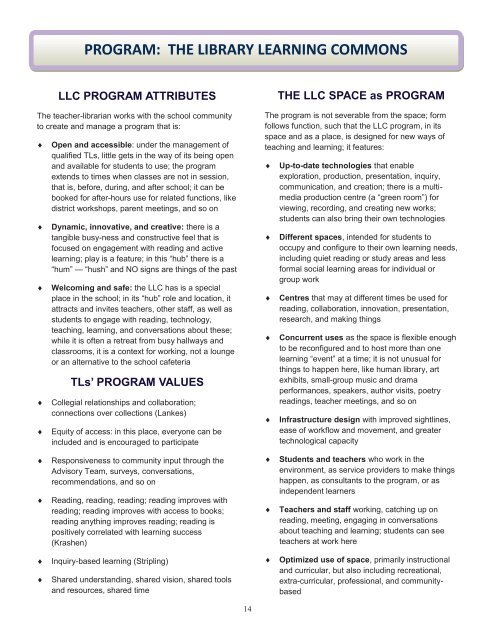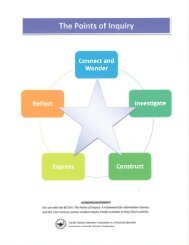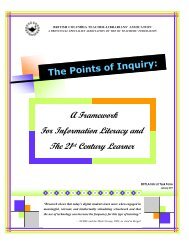FROM SCHOOL LIBRARY TO LIBRARY LEARNING COMMONS:
A source document for transforming K-12 school libraries into Library Learning Commons in BC, developed by the BC Teacher Librarians' Association
A source document for transforming K-12 school libraries into Library Learning Commons in BC, developed by the BC Teacher Librarians' Association
Create successful ePaper yourself
Turn your PDF publications into a flip-book with our unique Google optimized e-Paper software.
PROGRAM: THE <strong>LIBRARY</strong> <strong>LEARNING</strong> <strong>COMMONS</strong><br />
LLC PROGRAM ATTRIBUTES<br />
The teacher-librarian works with the school community<br />
to create and manage a program that is:<br />
<br />
<br />
<br />
<br />
<br />
Open and accessible: under the management of<br />
qualified TLs, little gets in the way of its being open<br />
and available for students to use; the program<br />
extends to times when classes are not in session,<br />
that is, before, during, and after school; it can be<br />
booked for after-hours use for related functions, like<br />
district workshops, parent meetings, and so on<br />
Dynamic, innovative, and creative: there is a<br />
tangible busy-ness and constructive feel that is<br />
focused on engagement with reading and active<br />
learning; play is a feature; in this “hub” there is a<br />
“hum” — “hush” and NO signs are things of the past<br />
Welcoming and safe: the LLC has is a special<br />
place in the school; in its “hub” role and location, it<br />
attracts and invites teachers, other staff, as well as<br />
students to engage with reading, technology,<br />
teaching, learning, and conversations about these;<br />
while it is often a retreat from busy hallways and<br />
classrooms, it is a context for working, not a lounge<br />
or an alternative to the school cafeteria<br />
TLs’ PROGRAM VALUES<br />
Collegial relationships and collaboration;<br />
connections over collections (Lankes)<br />
Equity of access: in this place, everyone can be<br />
included and is encouraged to participate<br />
THE LLC SPACE as PROGRAM<br />
The program is not severable from the space; form<br />
follows function, such that the LLC program, in its<br />
space and as a place, is designed for new ways of<br />
teaching and learning; it features:<br />
<br />
<br />
<br />
<br />
<br />
Up-to-date technologies that enable<br />
exploration, production, presentation, inquiry,<br />
communication, and creation; there is a multimedia<br />
production centre (a “green room”) for<br />
viewing, recording, and creating new works;<br />
students can also bring their own technologies<br />
Different spaces, intended for students to<br />
occupy and configure to their own learning needs,<br />
including quiet reading or study areas and less<br />
formal social learning areas for individual or<br />
group work<br />
Centres that may at different times be used for<br />
reading, collaboration, innovation, presentation,<br />
research, and making things<br />
Concurrent uses as the space is flexible enough<br />
to be reconfigured and to host more than one<br />
learning “event” at a time; it is not unusual for<br />
things to happen here, like human library, art<br />
exhibits, small-group music and drama<br />
performances, speakers, author visits, poetry<br />
readings, teacher meetings, and so on<br />
Infrastructure design with improved sightlines,<br />
ease of workflow and movement, and greater<br />
technological capacity<br />
<br />
<br />
Responsiveness to community input through the<br />
Advisory Team, surveys, conversations,<br />
recommendations, and so on<br />
Reading, reading, reading; reading improves with<br />
reading; reading improves with access to books;<br />
reading anything improves reading; reading is<br />
positively correlated with learning success<br />
(Krashen)<br />
<br />
<br />
Students and teachers who work in the<br />
environment, as service providers to make things<br />
happen, as consultants to the program, or as<br />
independent learners<br />
Teachers and staff working, catching up on<br />
reading, meeting, engaging in conversations<br />
about teaching and learning; students can see<br />
teachers at work here<br />
<br />
<br />
Inquiry-based learning (Stripling)<br />
Shared understanding, shared vision, shared tools<br />
and resources, shared time<br />
<br />
Optimized use of space, primarily instructional<br />
and curricular, but also including recreational,<br />
extra-curricular, professional, and communitybased<br />
14






